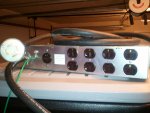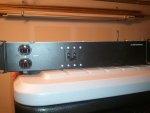I'm getting ready to upgrade some stuff for a much local sound company. I have a gig that i do yearly that requires me to very much walk the line when it comes to amperage. The outdoor venue has a 30amp service outlet and several 15amps and they will provide me with a distro that is loaded with 8 15amp circuits on GFI's that plugs into the 30amp. Even the band gear on it's own stringer will trip the GFI's. I'm thinking about building another small distro that is non GFI. It's your typical outdoor gig that needs more power than is available.
I'm going to request information from the city to assist in making this thing, what questions do I need to ask? I'm guessing I need to know the total amperage to point where this 30amp plug/ multi15amp is located. This distance from the outlet that I will be using to the distro will about 4 feet.
I can't really afford to buy a pre-made spider box so I'm going to just built a simple panel with a 4 wire input and hopefully 8 20 amp circuits.
I've installed circuits into a panel before and am quick with wiring electrical so I'm confident I can build one. I'm mostly concerned with no overloading the amperage that is available to me.
I'm going to request information from the city to assist in making this thing, what questions do I need to ask? I'm guessing I need to know the total amperage to point where this 30amp plug/ multi15amp is located. This distance from the outlet that I will be using to the distro will about 4 feet.
I can't really afford to buy a pre-made spider box so I'm going to just built a simple panel with a 4 wire input and hopefully 8 20 amp circuits.
I've installed circuits into a panel before and am quick with wiring electrical so I'm confident I can build one. I'm mostly concerned with no overloading the amperage that is available to me.


